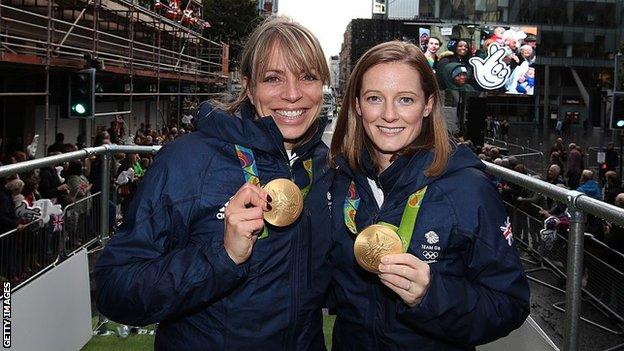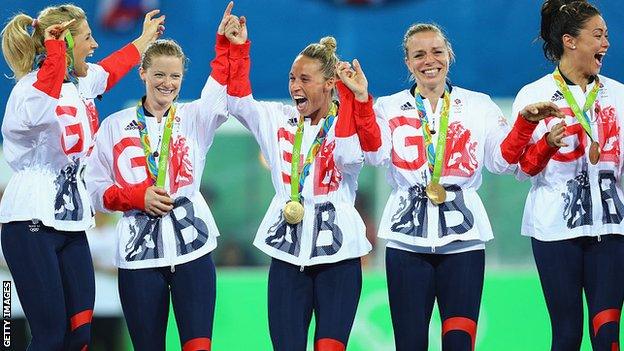Helen Richardson-Walsh: How Olympic gold medallist is helping WSL side Tottenham Hotspur
- Published

Helen Richardson-Walsh (right) won 17 medals representing England and Great Britain hockey. She took on the part-time role of performance psychologist for Spurs in March 2021
With 293 international caps and 17 medals representing England and Great Britain hockey, Helen Richardson-Walsh is one of British sport's all-time greats.
Following an illustrious 17-year career, the 40-year-old Olympic gold medallist studied for a degree in psychology and recently completed a masters degree in the subject.
Having retired in 2016, she is now using her international hockey experience and her degree in a part-time role as performance psychologist for Tottenham Hotspur women.
Richardson-Walsh spoke about the role in an interview with BBC Sport, during which she also discussed her early memories of being a Spurs fan, winning Olympic gold and the importance of psychology in professional sport.
'I sometimes have to pinch myself'
A lifelong Spurs fan, Richardson-Walsh is also a patron of the Proud Lilywhites, the official LGBTQ+ association of Tottenham.
"Tottenham is a club close to my heart," she told BBC Sport.
"I'm a Spurs supporter and have been for a very long time. I do have to pinch myself sometimes when I look at the fact that I've ended up here. I look around the training ground and it's surreal that I now have such a great connection with the club.
"Hockey was my first love, but they're a team that I grew up supporting and cheering on from the side-lines. I remember the 1991 FA Cup final, I remember watching the likes of Gazza and Gary Lineker, they were massive for me in supporting Spurs."
'I've experienced pretty much everything'

Richardson-Walsh won gold with Great Britain at Rio 2016
Throughout her decorated career, Richardson-Walsh had to overcome a number of injuries, forcing her out of the game for long periods, during which she admitted to struggling with her mental health.
After fighting her way back into the international set-up, she went on to win gold at the Euros and then scored in the penalty shoot-out at the Rio Olympics as GB won gold.
"I think I've experienced pretty much everything there is to experience as a professional sportswoman," she added.
"The winning, the losing, the injuries, not being selected - it's all part of sport. I struggled with my mental health through some of the difficult years and that's a key part of where I see my role here at Spurs.
"For me, performance includes wellbeing. If people are well - mentally and physically - they will perform at their best. Those two things go hand in hand for me."
In 2018 Richardson-Walsh was invited to Spurs, alongside wife Kate, to give a motivational talk to the women's team who, later that season, went on to secure promotion to the Women's Super League.
The pair spoke about the winning culture that drove Great Britain hockey to Olympic gold in 2016.
"Unless you've been an athlete you don't really know what it's like and that helps me relate to how players might be feeling," she explained.
"When I qualified as a psychologist, working with a sports team felt like the right fit and we are seeing women's sport grow so much lately, it's one of the reasons I wanted to get involved here at Spurs."
'We compared medals, hers is shinier'
Richardson-Walsh isn't the only Olympic gold medallist at Hotspur Way. Spurs defender Shelina Zadorsky won gold with Canada at Tokyo 2020 in the delayed Games this summer and the pair have since compared medals - and experiences.
"My medal is probably old news now," Richardson-Walsh said.
"We actually did a piece with the club together where we compared medals and spoke about our experiences within the Olympic Games and within the national teams.
"They were pretty much both the same size, but the Rio ones are much duller - hers is shinier.
"What's great about her story is how important the Canadian culture was and is to them. I saw a lot of similarities between the GB hockey team and the Canadian football team in terms of the environment they created and the team ethos."
The role of a performance psychologist
Having completed a degree in psychology during her playing days, she earned a masters degree in the subject last year.
Her role at the club role sees her work closely with both the players and management team to enhance and develop their psychological performance.
"A psychologist's job is to get the most out of everybody. We are capable of much more than people think as human beings.
"Psychology is an integral part of sport nowadays and the impact a psychologist can have when used well is huge.
"The very best sportsmen and women are the ones who try to find that extra 1%. Your mind controls everything so it's really important to know how to get the best out of what's going on inside your head."

The Nuremberg Trials: The remarkable aftermath of the verdict on the Nazi war criminals
From prison to president: Mohamed Nasheed is fighting for his island
